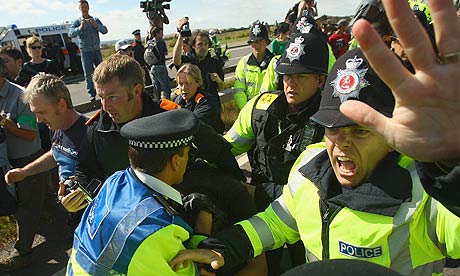UK: Kingsnorth power station plans shelved by E.ON

Kingsnorth
power station site has been the scene of many protests including Camp
For Climate Action last year. Photograph: Daniel Berehulak/Getty Images
E.ON, the energy group, tonight effectively threw in the towel on its plans to build a new coal-power station at Kingsnorth, blaming the recession.
In
a heavy blow to the government's plans to promote energy from coal, the
German company said lower demands for electricity due to the recession
had pushed the need for the new plant in the UK to around 2016.
The
company said, however, that it remained committed to the development of
cleaner coal and carbon capture and storage "which we believe have a
key role to play alongside renewables, gas and nuclear in tackling the
global threat of climate change while ensuring affordability and security of energy supplies".
While
the company described the decision as a postponement, the announcement
effectively scuppers the whole project, green groups said.
Kingsnorth
has been shrouded in controversy ever since inception, with protests
over several years including a high-profile Climate Camp protest.
Six Greenpeace protesters who climbed the smokestack at the plant were later acquitted after the jury accepted the plant posed a greater threat than the activities of the activists.
Environmentalists hailed the decision as a victory against dirty coal.
"This
development is extremely good news for the climate and in a stroke
significantly reduces the chances of an unabated Kingsnorth plant ever
being built," said Greenpeace executive director John Sauven.
"The
case for new coal is crumbling, with even E.ON now accepting it's not
currently economic to build new plants. The huge diverse coalition of
people who have campaigned against Kingsnorth because of the threat it
posed to the climate should take heart that emissions from new coal are
now even less likely in Britain."
He added: "Ed Miliband [the
environment secretary] now has a golden opportunity to rule out all
emissions from new coal as a sign of Britain's leadership before the
key Copenhagen climate meeting. With E.ON's announcement he's now got
an open goal."
E.ON insisted that the Kingsnorth project was not dead and its decision stemmed from specific economic decisions.
"Kingsnorth
is not dead at all," said Jonathan Smith, an E.ON spokesman. "The
application was made in 2006 and no one could have foreseen the fall in
demand and the drop in wholesale prices. Demand has fallen so much
because of the recession that there is no need for a new plant."
E.ON also pointed out that it has yet to receive government permission to go ahead with the project.
E.ON
submitted an application to the government for a £1bn investment to
build two new coal stations that it said would use the latest
technology to produce coal more efficiently and more cleanly than ever
before in the UK.
Should the project go ahead, the coal units
would be the first to be built for more than 20 years. E.ON says the
stations at 800MW each would be 20% more efficient than the existing
1940MW dual-fired power station, producing enough electricity to supply
about 1.5m homes.
The company claims the new plants would allow for a reduction in carbon emissions
of almost 2m tonnes a year compared to current plant performance. But
green groups oppose the plans, arguing they are at odds with the
government's commitment to reduce emissions by 60% by 2050.
- 104 Globalization
- 183 Environment